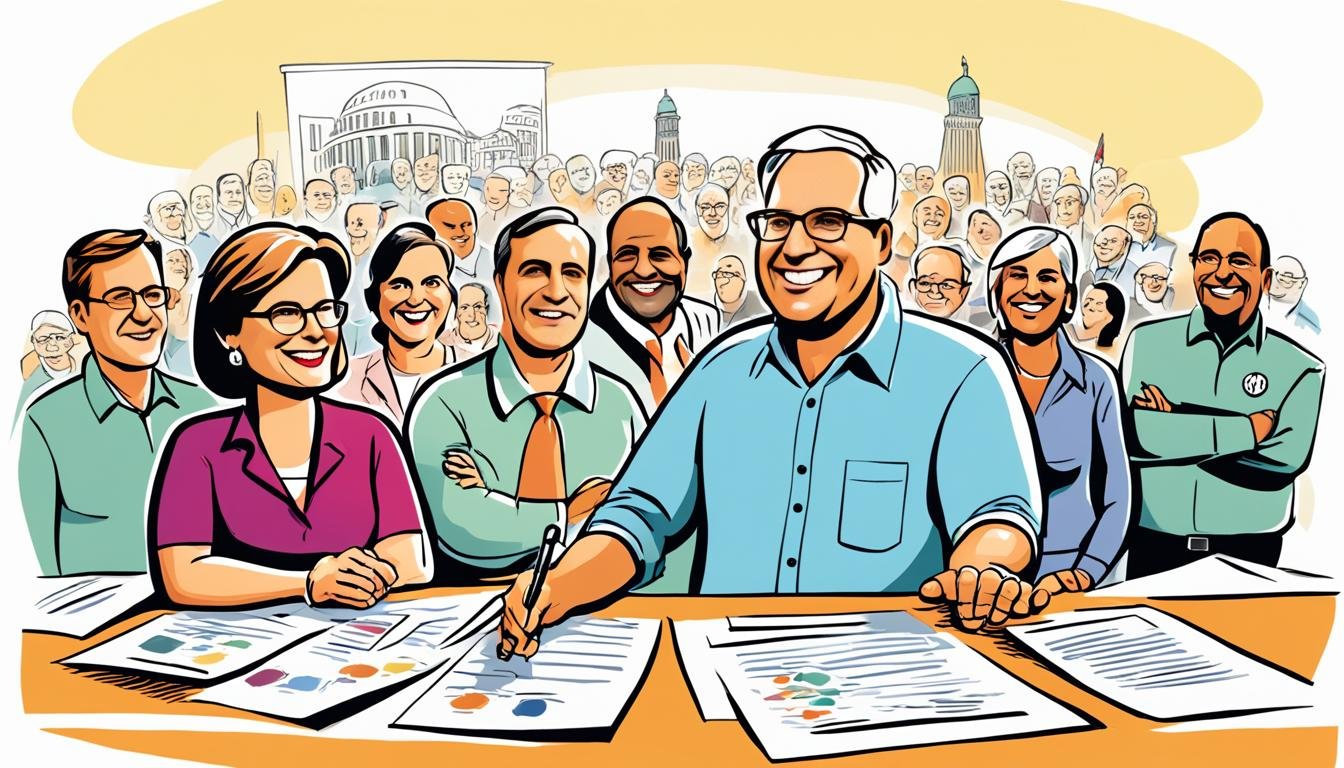Leadership in Government: Serving Communities
“The function of leadership is to produce more leaders, not more followers.” – Ralph Nader
Good leadership in government is crucial. It helps serve communities and meet resident needs. Leaders ensure the public sector tackles what matters most for the community.
They do this by working with others and making smart choices. This builds trust and confidence among the people they serve. In doing so, they make a positive difference in many lives.
Key Takeaways:
- Leadership in government aims to create more leaders who help the community.
- Skills like good communication are vital for government officials.
- Good leadership is key for meeting community needs and building trust.
- Government officials can greatly improve the lives of those they serve.
- By focusing on growing leadership, officials leave a lasting, positive mark.
Why is Active Government Leadership Important?
Active leadership in government is key to fair and engaging governance. It helps meet community needs by leading research, taking direct action, and creating new strategies. This aligns the local government with the community’s goals, driving progress and new ideas.
Equitable governance is at the core of active government leadership. It involves creating a level playing field, promoting fairness, and ensuring that all community members have equal access to opportunities and resources.
Encouraging people to get involved is crucial. With citizens’ input, leaders learn about the community’s concerns and hopes. This helps leaders make decisions that are good for everyone.
Leaders also focus on figuring out what the community really needs. They look at the situation closely and make smart plans. This way, they can use resources the right way, provide important services first, and start projects that really matter to people.
Driving Research and Development to Foster Progress
Research and development, or R&D, are key in government leadership. By investing in R&D, leaders can find new answers to hard problems, make services better, and make the whole system work well.
Effective government leadership embraces research and development as a catalyst for positive change. Through a proactive approach to R&D, leaders can stay ahead of evolving trends and emerging issues, facilitating forward-thinking solutions and delivering optimal outcomes for the community.
To wrap it up, active leadership makes governance fair and engaging, and it drives community progress. With a focus on R&D, leaders build a local government that’s dynamic and meets people’s changing needs and dreams.
Tips for Effective Government Leadership
Below are ten tips for government officials. They aim to boost leadership skills and positively impact communities:
- Make effective communication a top priority. This means having clear and direct talks with both your team and the community. It builds trust, transparency, and keeps information flowing well.
- Involve others in collaborative decision-making. Getting input from many leads to better decisions. This includes more perspectives and ensures choices that help the community.
- Have a strong vision for the future of your government. A clear, inspiring vision guides your team and brings everyone together towards one goal.
- Be ready to change and adapt. In changing times, those in government must be flexible. They need to tweak strategies and adapt to new situations quickly.
- Always promote ethical behavior. This means always acting with honesty and accountability. It builds trust with the public and creates a culture of trust within the team.
- Sharpen your problem-solving abilities. Encourage thinking outside the box. Explore new solutions to tough problems, ensuring better outcomes for the community.
- Focus on government resilience. Having resilience means being ready for tough times. It ensures quick recovery and that vital services for the community continue.
- Build strong relationships with everyone. This includes the public, stakeholders, and other agencies. Strong ties help with teamwork, boost community involvement, and improve solving problems together.
- Never stop learning. Stay updated on skills, technologies, and new insights. Ongoing learning equips officials to lead well and make smart choices.
“Effective leadership is not about being in charge. It is about taking care of those in your charge.”
Follow these tips to boost leadership. Help communities thrive and grow under your governance.
Personal and Professional Integrity in Government Leadership
Integrity is key for government leaders. It covers ethical behavior, how they make decisions, and being accountable. Leaders should show good integrity. This helps others to trust them and makes sure the organization acts ethically, too.
Ethical behavior is crucial for a leader’s integrity. They must follow a set of ethics. This helps them to be fair, open, and responsible in their job.
Making ethical decisions is a must for government leaders. They should think about what’s best for everyone and keep to high moral standards. It’s about looking at who will be affected by their decisions and balancing short and long-term goals.
“Integrity is doing the right thing, even when no one is watching.” – C.S. Lewis
Being accountable is very important. Leaders have to own up to their choices. They should understand how their decisions impact others and the group. This shows they are open and willing to fix mistakes.
Integrity also links to the ethics of the whole organization. Leaders need to set and encourage ethical standards. They should make rules that promote good behavior and help their staff choose what’s right. This builds a work culture that prizes honesty and ethics.
The Role of Personal and Professional Integrity in Government Leadership
Integrity builds trust between the government and its people. When leaders act ethically and are responsible, they become trustworthy. This shows they care about the community’s well-being.
Integrity also makes government leadership more effective. By focusing on what’s fair and right, leaders work for the good of all. This earns them the respect of the community and their team.
Lastly, integrity is crucial for ethical governance. If leaders act with integrity, they encourage honesty and trust. This benefits everyone in the community and makes the government better.
| Benefits of Personal and Professional Integrity in Government Leadership | Examples |
|---|---|
| Enhanced trust and credibility with the community | A government leader who consistently acts with integrity will gain the trust and respect of the community, leading to increased collaboration and support. |
| Fostering ethical behavior throughout the organization | By setting a positive example, government leaders can inspire their staff to behave ethically and uphold the organization’s values. |
| Improved decision-making processes | Leaders who prioritize integrity in decision-making ensure that choices align with ethical principles and serve the best interests of the community. |
| Establishing a culture of transparency and accountability | Leading with integrity creates a culture where transparency and accountability are valued and promoted at all levels of the organization. |
Community Engagement in Government Leadership
It’s vital for government officials to work closely with the community. This helps ensure leaders’ decisions match what the people need and want. Engaging with the public means encouraging them to take part, supporting their views, and creating a respectful atmosphere for discussing all ideas.
These officials should always look for ways to connect with everyone. By hearing what people think and desire, they can earn trust and a feeling of belonging from the community. This approach gives a voice to citizens and helps leaders make choices that benefit everyone.
“Community engagement is not simply about informing or consulting with the public; it is about actively involving citizens in shaping policies and programs.”
A strong outreach is key during decision-making. Leaders get various opinions through meetings and online talks. This way, they show the community’s knowledge matters, leading to decisions that are better for all.
Promoting Civility and Advocacy
It’s important for government leaders to promote being polite and kind in the community. Their own actions can lead to helpful talks and lessen arguments.
Also, leaders should stand up for different opinions. They make sure everyone’s voice is heard and considered. This helps create a fair space where each person feels valued, no matter their differences.
Engaging with Key Stakeholders
Working with important groups is also key for community engagement. These groups might be local organizations or schools. By joining forces, leaders can use their skills and tools to meet community needs and reach common goals.
Image: Community Engagement
Engaging with the community benefits both sides. By encouraging the public to join in, promoting their causes, and being open to all views, leaders create a strong and shared community vision. These actions make government choices more fitting, responsive, and in tune with the community’s wishes.
Benefits of Community Engagement in Government Leadership
| Benefits | Explanation |
|---|---|
| Increased Trust and Transparency | Engagement builds trust and transparency by involving the community in decision-making processes. |
| Informed Decision-making | Engaging with the community ensures that decisions are well-informed and consider diverse perspectives. |
| Enhanced Public Satisfaction | Engagement leads to greater public satisfaction as citizens feel heard and their needs are taken into account. |
| Improved Policy Implementation | Engagement fosters a sense of ownership, resulting in better policy implementation and community support. |
| Stronger Social Cohesion | Engagement strengthens social cohesion by promoting dialogue, inclusivity, and understanding among community members. |
Equity and Inclusion in Government Leadership
Government leaders are key in making a fair and inclusive place for both their team and the public. To achieve this, they must welcome different cultures and push for everyone to have a fair chance. It’s crucial to listen and respect a wide range of opinions, backgrounds, and skills.
To really include everyone, leaders should make sure all voices count in decisions. They need to actively gather diverse views. This way, the government can make choices that truly meet the community’s needs.
It’s also vital for leaders to ensure that services reach everyone fairly. They should find and break down barriers that stop some groups from getting what they need. This effort helps build a community where everyone is treated right.
Inside the organization, leaders must encourage respect for all. Every person’s unique talents should be highly regarded. This helps create a space that values fresh ideas and smart choices.
“Equity and inclusion are not just moral imperatives; they are strategic imperatives for government leaders who aim to create thriving communities that honor the worth and potential of every individual.”
In summary, focusing on equity and inclusion is a must for government leaders. By listening to a wide range of people, respecting diverse opinions, and making services fair, leaders can truly support their communities. This approach paves the way for a fairer, more successful society.
Staff Effectiveness in Government Leadership
Government leaders are key to making their staff work well. By focusing on their team’s growth and creating a good workplace, leaders boost teamwork and performance. They help build a culture where productivity thrives.
Employee development is crucial for how well staff does their jobs. Leaders should offer chances for learning and career growth. This covers training, workshops, and mentoring. By supporting their team members’ growth, leaders help them excel and aid the organization.
Moreover, leaders need to push for teamwork to make staff more effective. When colleagues work together well, they find new ideas, make better choices, and do more. Leaders can do this by promoting talking openly, defining everyone’s job clearly, and making the team feel like a close group.
The Role of Performance Evaluations
Performance evaluations are a must for developing staff and keeping them responsible. Leaders should check in with their team often to give feedback, praise good work, and note areas that need work. This helps workers know where they stand and what they need to do better.
To keep the workplace positive, leaders should focus on respect and professionalism. They need to treat everyone fairly and kindly, help balance work with personal life, and solve any problems quickly. A good workplace makes workers happier, motivated, and well.
“A positive atmosphere in the workplace is key to staff morale and productivity. When employees feel valued, supported, and respected, they are more likely to perform at their best and contribute to the organization’s goals.” – John Smith, Government Leadership Expert
When leaders improve staff and team work, their groups work together well. This, in turn, allows them to better serve the community. It’s good for the organization and makes the workplace a better place.

| Benefits of Staff Effectiveness in Government Leadership | Actions of Government Leaders |
|---|---|
|
|
Personal Resiliency and Development in Government Leadership
As government leaders, focusing on our own resiliency and growth is key. It helps us serve our communities better. We should set a good example with our work habits, keep growing personally and professionally, and be mindful. This approach helps us balance work and life, leading to success in our roles.
Creating boundaries between work and personal life is important. Mixing the two can lead to burnout. We must make time for ourselves, relax, and enjoy hobbies. This way, we recharge and perform better at work.
Never stop learning. We need to keep up with new policies and technologies to meet our community’s needs. This means we should attend workshops, conferences, and training programs to improve our skills.
The Benefits of Personal Resiliency and Development in Government Leadership
Improving ourselves has a ripple effect on our communities. When we focus on our well-being and growth, our decision-making and communication improve. We lead with more empathy. This creates a positive work culture and builds trust.
“Investing in personal resiliency and development not only benefits us as individuals but also has a positive impact on our communities.”
Being resilient helps us tackle change and stress effectively. Leaders often face tough situations. But being resilient helps us find creative solutions. It’s essential for serving our communities well.
Demonstrating Personal Resiliency and Development
Here’s how you can enhance your own resiliency and development in government leadership:
- Manage stress with mindfulness and exercise.
- Take time for self-reflection and goal setting.
- Get advice from mentors or peers.
- Always keep learning with books, seminars, or online courses.
- Strive for a good balance between work and life.
- Encourage personal growth in your team or organization.
By following these steps, you’ll boost your resiliency and development. This way, you’ll excel as a leader and positively influence your community.
| Benefits of Personal Resiliency and Development | Practical Strategies for Personal Resiliency and Development |
|---|---|
| 1. Enhanced decision-making skills | 1. Practice stress management techniques |
| 2. Improved communication and empathy | 2. Set aside time for self-reflection and goal setting |
| 3. Increased adaptability and problem-solving abilities | 3. Seek support from mentors or peers |
| 4. Positive work environment and team dynamics | 4. Engage in continuous learning |
| 5. Trust and confidence from constituents | 5. Embrace work-life balance |
| 6. Effective stress and adversity management | 6. Encourage a culture of personal development |
Strategic Leadership and Planning in Government
Strategic leadership is key for running a government well. It’s about having a clear vision and sharing it to inspire others. When leaders set a vision that meets the community’s needs, it guides their organization.
Leaders also need to make the best use of what they have. They should wisely use available resources. This helps them work better, even when resources are limited. Good management of what’s on hand is crucial for reaching the organization’s goals.
In leadership, always looking to get better is a must. Leaders must create a place where learning and trying new things are encouraged. This way, their teams can evolve as needs change, keeping the organization effective. Forward-thinking helps government bodies provide better service to the public.
In the words of Peter Drucker, “The best way to predict the future is to create it.”
Being strategic means sometimes taking risks. Taking risks can spark great ideas and change. Leaders support a culture where new, bold ideas are not only safe but also encouraged. This kicks off a cycle of creativity and progress, unlocking the best in their organization.
Knowing how to work well with others is crucial too. Strong relationships and clear communication are necessary skills. They help leaders work with all kinds of people, whether inside or outside their organization. Good people skills can help leaders understand diverse viewpoints and earn trust.
Innovation in Strategic Leadership
Innovation drives strategic leaders forward. By promoting innovation and creativity, they spark new and smarter ways of doing things. Adopting new technologies, polishing processes, and improving services follow.
Having a plan is at the heart of strategic leadership. It’s about making a detailed action plan that everyone can follow. This roadmap unites everyone around common goals, ensuring focus and success. This approach guides decisions and resource use, helping the organization stay true to its mission and benefit the community.
Conclusion
Leadership in government is key to helping communities. It involves strong communication, working together, being ethical, and always learning. When officials talk openly and work together, they can understand and meet community needs.
Working with others lets them come up with new ideas. This helps solve big problems and grow the community. Being ethical builds trust. Officials must always make decisions that are good for everyone fairly.
Learning never stops for leaders. They need to keep up with new things to make good choices. By doing all these things well, they can really make a difference in the places they serve.
FAQ
What is the importance of leadership in government?
Good leadership in government ensures public duties are well managed. It helps meet community needs and boosts teamwork. This builds trust and satisfaction with the local government.
Why is active government leadership important?
Active leadership supports fairness and listening to citizens. By working to meet community needs, leaders improve their government’s performance. They research, act, and keep making things better.
What are some tips for effective government leadership?
Government officials can improve their leadership by following a few tips. These include clear communication and working together on decisions. A strong vision and being able to change are also key. Other tips are to act ethically, solve problems, and grow as a leader.
What role does personal and professional integrity play in government leadership?
Integrity is very important in government leadership. It means showing honesty and following ethical guidelines. Leaders should be a good example and make sure everyone understands these standards.
Why is community engagement important in government leadership?
Engagement with the community is crucial for government leaders. It means working closely with the public. They promote listening to different opinions and sharing important information. This helps keep the trust of the community.
How does equity and inclusion factor into government leadership?
Leaders should create a fair and welcoming space for all. This means including everyone, especially those who might be left out. They should make sure services are fair and work to include all voices.
What is the importance of staff effectiveness in government leadership?
Leaders make sure their team is doing a great job. They provide support and help their staff succeed. A good leader is someone that their team can look up to, who encourages growth, and keeps a professional and respectful workplace.
How does personal resiliency and development impact government leadership?
Leaders should set an example by taking care of their own well-being and growth. They should strive to be their best selves both at work and in their personal life. This helps them be better leaders.
What is the role of strategic leadership and planning in government?
Strategic leaders have a clear vision and plan for their group’s success. They use resources well and keep improving. This includes encouraging innovation and managing risks smartly. Planning brings everyone together and guides action toward common goals.
How does leadership in government serve communities effectively?
Effective leadership makes communities better. By communicating well and working as a team, officials can lead with honesty and skill. This helps everyone in the community.








